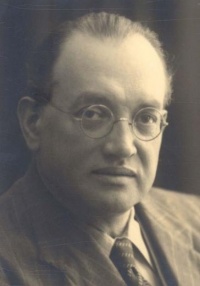

 Asdrubal
Antonio d’Aguiar (1883 - November 28, 1961) was a Portuguese medical doctor.
Aguiar was born in Lisbon; he graduated in 1912 and immediately entered the
Institute of Forensic Medicine of Lisbon as an assistant. He made his career
in this institution, rising to a senior position. He also held a number of
other posts, including a teaching post in the Faculty of Medicine, and, as an
Army captain, was responsible for the medico-legal services of the Lisbon
Garrison.
Asdrubal
Antonio d’Aguiar (1883 - November 28, 1961) was a Portuguese medical doctor.
Aguiar was born in Lisbon; he graduated in 1912 and immediately entered the
Institute of Forensic Medicine of Lisbon as an assistant. He made his career
in this institution, rising to a senior position. He also held a number of
other posts, including a teaching post in the Faculty of Medicine, and, as an
Army captain, was responsible for the medico-legal services of the Lisbon
Garrison.
Aguiar became Portugal's leading expert on forensic medicine. He published extensively on the subject, both as a practical discipline and as an aid to interpreting history. Many of his works relate to sexual offences, including rape and indecency. He wrote accounts of the female sexual organs and described sexual and gender anomalies of various types. These included male homosexuality and lesbianism, to which he devoted several works.
In Evolução da Pederastia e do Lesbismo na Europa (Evolution of Pederasty and Lesbianism in Europe), written in 1918 and published in 1926, he described the situation of homosexuals, both male and female, in the countries of Europe, including Portugal. The opening chapter summarises contemporary knowledge about manifestations of homosexuality, noting that homosexuals were to be found in all social classes, and listing the slang terms, meeting-places, occupations, average ages of male prostitutes, examples of blackmail, ways of dressing and talking, physical characteristics, emotional relationships, sexual practices and social behaviour of male homosexuals and lesbians. The sources are the medical and forensic treatises of the late nineteenth century. The rest of the work comprises a vast compendium of historical information about male and female homosexuality, divided by period and country. Although most of the content is drawn from published works, the section on contemporary Portugal includes a number of recent anecdotes and reproduces case notes on prisoners arrested for homosexuality whom Aguiar had personally interviewed. The final part summarises Portuguese law on homosexual acts. This work is written from a detached, professional viewpoint and is relatively objective.
Aguiar's work complemented that of another author published under the auspices of the Lisbon forensic institute. Arlindo Camilo Monteiro was a doctor interested both in the history of medicine and in artistic and literary matters who gave a number of papers at scientific conferences before moving to Brazil. His Amor Sáfico e Socrático (Sapphic and Socratic Love), published in 1922, is a compendious work containing information on all aspects of homosexuality but concentrating on Portugal. In the first part, Monteiro describes the historical evidence for homosexuality in Antiquity and in the countries of Europe and the rest of the world, before going into more detail about the Iberian Peninsula and Portugal. The longer second part of the work covers contemporary scientific knowledge about homosexuality. Drawing extensively on French, German and Italian writers, Monteiro discusses aspects of male and female homosexuality, bisexuality and hermaphroditism, psychiatric and medical theories, therapeutic and preventative measures, and the legislation of foreign countries and Portugal.
Monteiro's work is more impassioned than that of Aguiar. He frequently uses negative moralistic terms to describe homosexual activity and even defends the Inquisition against its nineteenth-century critics, yet the sheer amount of detail and the care with which documents are transcribed suggests a labour of love. Occasionally he slips into a defence of homosexuals against the more extreme attacks of writers such as Francisco Ferraz de Macedo, and he acknowledges the widespread prevalence of the phenomenon.
The two works show how far contemporary medico-scientific knowledge about homosexuality had been absorbed in Portugal by the 1920s. Their greatest interest today, however, lies in their transcription of legal texts and references to historical events. With their detailed footnotes, they serve as invaluable guides to historians.
Other Portuguese doctors who wrote on homosexuality during the first half of the twentieth-century include Egas Moniz, one of the leading medical authorities of the day, who thought that homosexuals could be cured, and Luís A. Duarte Santos, a lecturer at the University of Coimbra. Writing in 1943, Duarte Santos rejected the idea that homosexuality was inborn, arguing that it was caused by external factors and that homosexuals were responsible for their actions. He applauded the recent dismissal of the poet António Botto from his government post.
My published books: